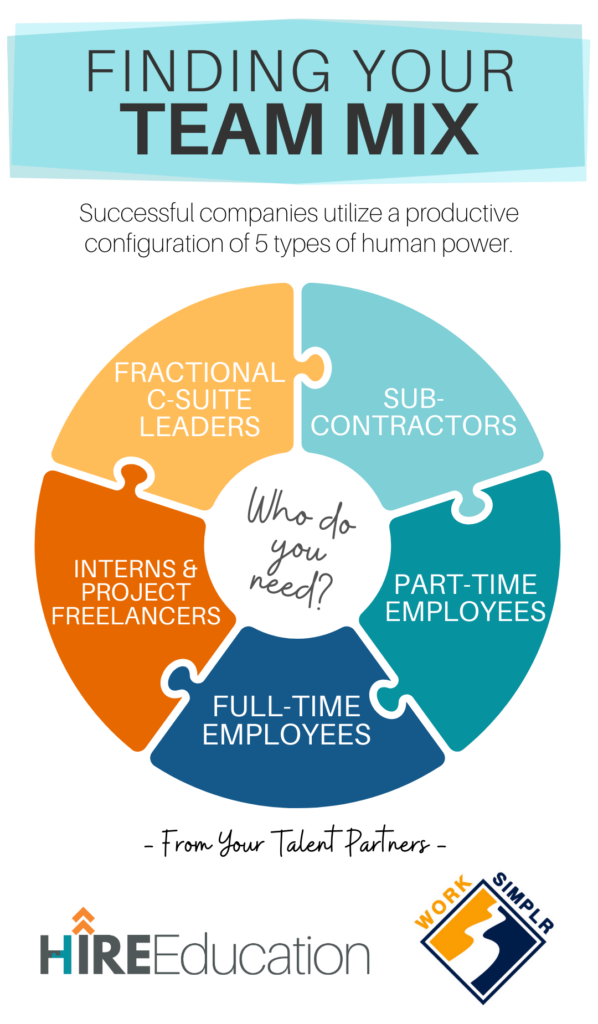At HireEducation we believe that people are the key ingredient to impact and sustainable growth, thus making hiring one of the most critical tasks.
But do you always have to hire full-time employees? Who needs to be on your core leadership team? What does the next layer of team members look like? Can the work of the organization be carried out by various types of contributors?
We tackle these questions all the time with clients, and the truth is that there is an entire ecosystem of hires that can support a company’s goals.
The way we see it, companies need different types of talent for different tasks or for different stages in their life cycles. When trying to figure out what your company needs, ask yourself:
- What needs to be done?
- Who is the best person to do that work?
- How might that person best fit with the rest of the team?
In the talent ecosystem different types of talent work and relate together in balance.
The 5 Types of Human Power
1. Full-time Employees
Full-time employees are the lifeblood of your organization. They become part of the company culture and their dedication and collaboration should accelerate your growth. If the demands of the work to be done can fill a 40-hour week or longer-term or continual efforts are needed, you may need someone full-time. For example, you can’t have a salesperson there for only six months or project managers who swap out every six months. It’s just not efficient. The cost of using sub-contractors can also add up quickly, so a full-time employee can also make financial sense. Do the math and try to measure those intangible contributions of creativity and culture too!
2. Fractional C-Suite Leaders
As a young company, before you can afford full-time C-Suite employees, you might opt to hire a fractional person. Fractional C-Suite leadership often split their time between a few companies, making it more cost-effective. For example, a fractional CRO, CFO, or CMO can come in and help you roadmap. Fractional Leaders can be more hands-on than contractors (in the day-to-day, attending high-level meetings, interfacing with your Board), but they aim to elevate your strategy, tactics, and the big picture. To learn more, check out this great podcast interview on the topic. Our team here at HireEducation has a strong network of fractional leaders and we would love to explore this type of placement with you. Reach out to us!
3. Sub-Contractors
Similar yet different, sub-contractors are more skilled part-time workers. Contractors tend to work with multiple clients and often have specific expertise in certain areas. Contracts can be project-based and finite or ongoing to fill certain needs. You don’t need to pay taxes or give them benefits, so using contractors can be less expensive (depending on what they’re doing).
4. Part-time Employees
You might hire part-time workers for a number of reasons. If you don’t have enough work in a particular area to warrant a full-time person yet, or the person you want to hire has other commitments (high school or college, for example), or you can’t yet afford to bring in someone full-time. Some part-time employees receive benefits depending on the number of hours they work.
5. Interns and Project Freelancers
Offloading basic tasks reduces stress for a company’s full-time employees and opens them up to do higher-level creative, strategic, and analytical work. At the same time, we know that “Interns & Project Freelancers” is often synonymous with HEADACHE, but we have a recommendation here: check out Work Simplr!
Work Simplr is a platform designed for outsourcing specific entry-level projects, particularly ideal for startups seeking to streamline tasks. All workers on Work Simplr are vetted students managed throughout projects to ensure accuracy and timeliness. Unlike traditional freelancing platforms, Work Simplr excels in rapidly scaling project work with large student teams, offering a unique advantage.
This platform not only benefits companies but also provides valuable work experience and job skills to students. College students seeking flexible work opportunities excel in tasks that may be considered tedious for experienced employees. Work Simplr aims to bridge the gap between companies and this untapped talent pool, enabling executives to offload routine tasks efficiently.
By using Work Simplr, companies can refocus valuable time on growth and strategic endeavors, avoiding heavy investments in specialized talent prematurely. This innovative approach not only supports company expansion but also contributes to student development, underscoring Work Simplr’s commitment to enhancing student lives and fostering professional growth.
Definitely check them out for those mundane-yet-essential tasks!
So how can we help you and your company? If you need high-performing, collaborative talent (fractional or full-time!), we at HireEducation would love to talk to you. Give us a call at 877-HireEdu!
If you’re just getting started and could use some industrious students to help with some of the tedious-yet-necessary work at hand, why not check out Work Simplr at worksimplr.com? We hope you find the talent you need to make your business thrive!
More Resources

We get it, interviews can be stressful. They are your main chance to determine if you are a fit for the job. While there are lots of things you should [...]

“The only constant in life is change” -Heraclitus No matter where you are in a company, your career there is unpredictable. Call to mind 10 different decision-makers at your place [...]

Interview prep is not just for candidates! In today’s market, hiring managers must consider how they will attract and secure their ideal candidates as much as candidates need to think [...]

